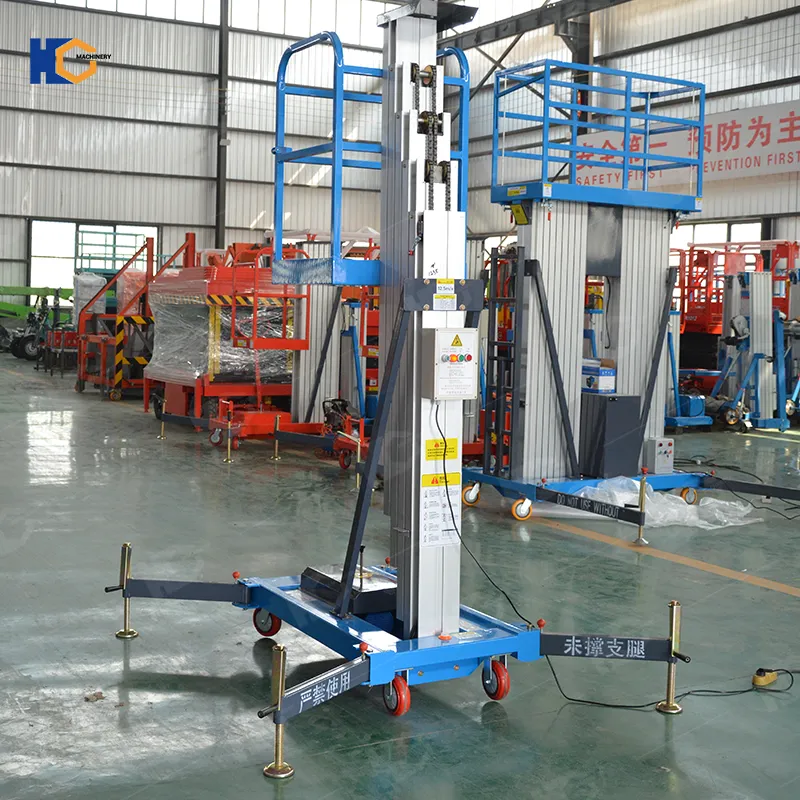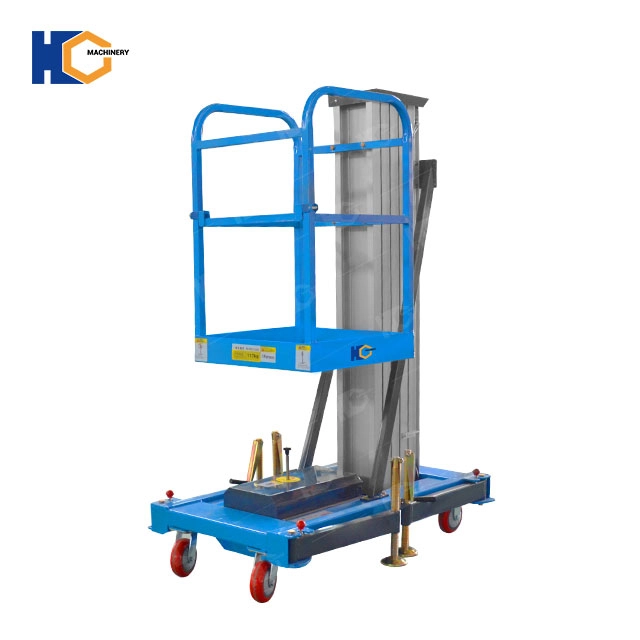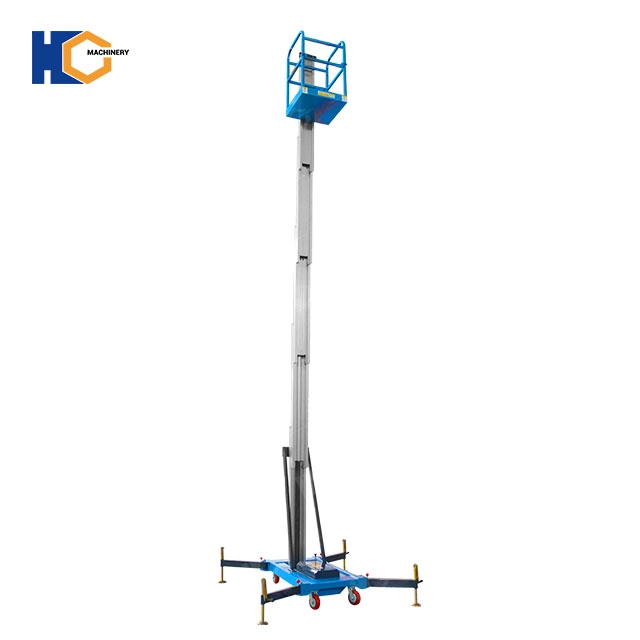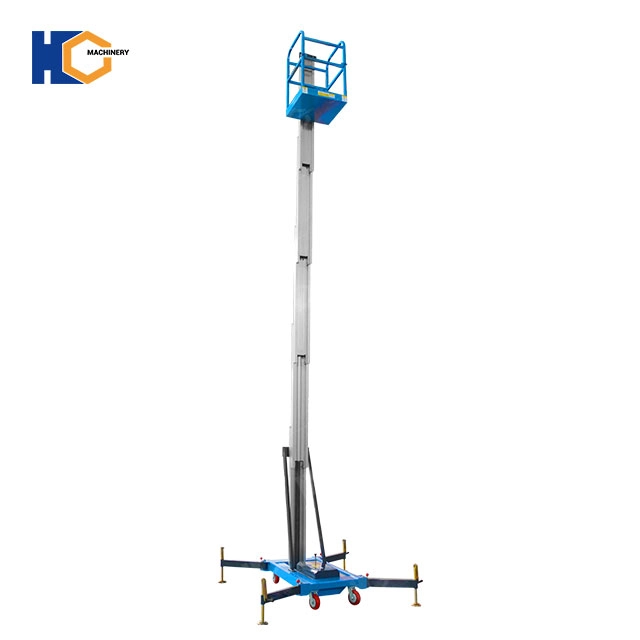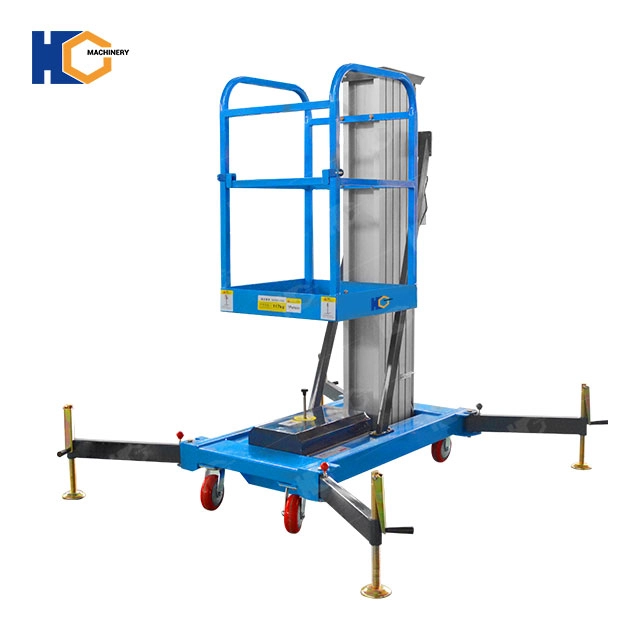As a leading Chinese manufacturer specializing in aerial work platforms, we are proud to present our 10m Electric Hydraulic Lifter Mobile Mast Lift Aerial Working Platform. This innovative product is designed to meet the demands of various industries, including construction, maintenance, warehousing, and industrial applications. With its advanced electric hydraulic technology, robust design, and user-friendly features, this platform is engineered to enhance productivity, safety, and efficiency in elevated work environments.
Product Overview
The 10m Electric Hydraulic Lifter Mobile Mast Lift Aerial Working Platform is a versatile and reliable solution for tasks requiring precise height adjustment and stability. It features a mobile mast design, allowing for easy movement and positioning, while its electric hydraulic system ensures smooth and controlled lifting operations. With a maximum working height of 10 meters, this platform is ideal for both indoor and outdoor use, offering exceptional performance in confined spaces or large worksites.
Specifications Table
| Parameter | Details |
|---|---|
| Maximum Working Height | 10 meters |
| Platform Capacity | 200 kg (customizable) |
| Power Source | Electric (battery or mains-powered) |
| Mast Type | Mobile, telescopic |
| Platform Size | Customizable (standard: 0.8m x 1.5m) |
| Weight | Approx. 500 kg |
| Drive System | Electric hydraulic |
| Safety Features | Emergency stop, overload protection |
| Certifications | CE, ISO, ANSI compliant |
Key Features
The 10m Electric Hydraulic Lifter Mobile Mast Lift Aerial Working Platform stands out as a reliable, efficient, and versatile solution. Designed to meet the demands of various industries, this platform combines advanced technology, robust construction, and user-friendly features to deliver exceptional performance. Below, we delve into the key features that make this product a top choice for professionals worldwide.
1. Electric Hydraulic System
At the heart of this platform is its advanced electric hydraulic system, which ensures smooth and precise lifting operations. Unlike traditional mechanical systems, the electric hydraulic mechanism provides consistent power, allowing for seamless height adjustments up to 10 meters. This system is not only efficient but also remarkably quiet, making it ideal for indoor environments such as warehouses, factories, or retail spaces where noise reduction is critical. Additionally, the hydraulic system minimizes maintenance requirements, reducing downtime and operational costs over the long term.
2. Mobile Mast Design
The mobile mast design is one of the standout features of this platform. Equipped with sturdy wheels and a compact frame, the platform can be easily moved and positioned across different work areas. Whether you’re working on a construction site, in a warehouse, or outdoors, the mobility of this platform ensures that you can quickly adapt to changing job requirements. The mast’s telescopic design allows for easy extension and retraction, making it highly versatile for tasks that require varying heights.
3. Sturdy Construction
Durability is a hallmark of our 10m Electric Hydraulic Lifter Mobile Mast Lift Aerial Working Platform. Constructed from high-quality materials, including reinforced steel and corrosion-resistant components, this platform is built to withstand the rigors of daily use in demanding environments. Whether you’re working in harsh weather conditions or heavy-duty industrial settings, you can rely on this platform to deliver consistent performance. Its robust design not only enhances safety but also extends the product’s lifespan, providing excellent value for your investment.
4. User-Friendly Controls
Ease of use is a critical factor in any aerial work platform, and our product excels in this area. The platform features an intuitive control interface that allows operators to manage lifting, lowering, and positioning with minimal effort. Clear labeling, ergonomic buttons, and responsive controls ensure that even inexperienced users can operate the platform safely and efficiently. Additionally, the controls are strategically placed to provide optimal visibility and accessibility, further enhancing operator confidence and productivity.
5. Compact and Lightweight
One of the challenges of working in confined spaces is finding equipment that can operate effectively without compromising safety or performance. Our platform’s compact and lightweight design makes it perfect for such environments. Whether you’re navigating narrow aisles in a warehouse or working in a crowded construction site, this platform’s small footprint ensures easy access and maneuverability. Despite its lightweight construction, the platform maintains exceptional stability, thanks to its well-engineered base and mast design.
6. Safety Features
Safety is a top priority in the design of our 10m Electric Hydraulic Lifter Mobile Mast Lift Aerial Working Platform. The platform is equipped with a range of safety features to protect operators and ensure compliance with international safety standards. These features include:
Emergency Stop Button: Allows operators to halt operations immediately in case of an emergency.
Overload Protection: Prevents the platform from exceeding its weight capacity, reducing the risk of accidents.
Non-Slip Platform Surface: Provides a secure footing for operators, even in wet or slippery conditions.
Guardrails and Safety Harness Points: Enhance operator safety during elevated work.
These features, combined with rigorous testing and compliance with CE, ISO, and ANSI standards, make this platform one of the safest options available in the market.
Customization Options
We understand that every project has unique requirements. That’s why our 10m Electric Hydraulic Lifter Mobile Mast Lift Aerial Working Platform is fully customizable. Whether you need a specific platform size, additional safety features, or specialized power options, we can tailor the product to meet your exact needs.
Packaging and Transportation
To ensure the safe delivery of our products worldwide, we use high-quality, durable packaging materials. Each unit is carefully packed to prevent damage during transit. We work with trusted logistics partners to provide efficient and reliable shipping services, whether by sea, air, or land. Our team handles all export documentation and compliance requirements, ensuring a hassle-free experience for our international clients.
Order Process
Inquiry: Contact us with your requirements, including specifications, quantity, and delivery location.
Quotation: We provide a detailed quote, including product customization, packaging, and shipping costs.
Confirmation: Once the order is confirmed, we proceed with production.
Production: Our skilled team manufactures the product to your specifications, ensuring high quality and compliance with international standards.
Shipping: After thorough quality inspection, the product is securely packaged and shipped to your destination.
After-Sales Support: We offer comprehensive after-sales services, including technical support and spare parts availability.
Compliance with International Standards
Our 10m Electric Hydraulic Lifter Mobile Mast Lift Aerial Working Platform complies with major international standards, including CE, ISO, and ANSI. This ensures that our product meets the highest safety and quality benchmarks, making it suitable for global markets.
Why Choose Us?
Experienced Manufacturer: With years of expertise, we deliver reliable and innovative solutions.
Global Reach: Our products are exported to over 50 countries, earning trust worldwide.
Quality Assurance: Rigorous quality control processes ensure every product meets our high standards.
Competitive Pricing: We offer cost-effective solutions without compromising on quality.
Customer-Centric Approach: We prioritize customer satisfaction, offering tailored solutions and excellent support.
Conclusion
The 10m Electric Hydraulic Lifter Mobile Mast Lift Aerial Working Platform is a testament to our commitment to innovation, quality, and safety. Whether you're working on a construction site, maintaining industrial equipment, or handling warehouse operations, this platform is designed to elevate your efficiency and safety. As a trusted Chinese lift manufacturer, we are dedicated to providing world-class products and services to clients across the globe.
Contact us to learn more about this product or to discuss your specific requirements. Let us help you find the perfect solution for your elevated work needs!
